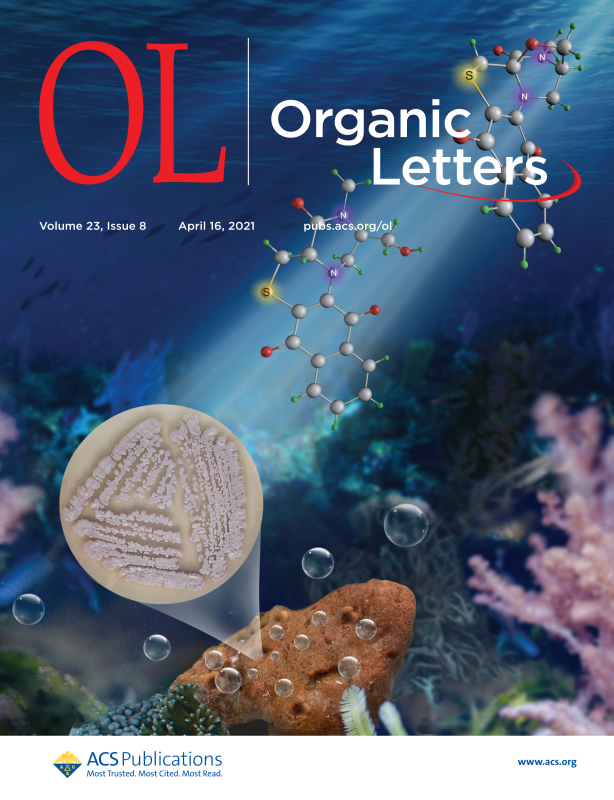Novel Sulfur-containing Alkaloids Discovered from Marine Sponge-derived Microbe
Both compounds were isolated from the marine sponge-derived actinomycete SCSIO 40065, featuring an unprecedented naphthoquinone[2,3-e]piperazine[1,2-c]thiomorpholine scaffold.
This work was published as a front cover paper in Organic Letters (Figure 2).

Figure 2. The issued cover art of two novel sulfur-containing alkaloids
Sulfur is an indispensable element for all kinds of lives. Sulfur-containing natural products, such as penicillin, ecteinascidin-743 and calicheamicin γ1, have been used as antibiotics and anti-tumor drugs.
Several kinds of natural products except for the sulfur-containing compounds have been reported from the actinomycetal species of Nocardiopsis dassonvillei. Interestingly, analysis of the extracts from N. dassonvillei SCSIO 40065 indicated the presence of sulfur-containing natural products.
The researchers elucidated the structures of these two sulfur-containing alkaloids by comprehensive spectroscopic analysis.
They investigated these unique metabolites from N. dassonvillei SCSIO 40065 and obtained two sulfur-containing alkaloids, dassonmycins A (1) and B (2). Natural alkaloids are generally composed of four elements: carbon, hydrogen, oxygen and nitrogen. Sulfur is seldom introduced into the chemical structures of natural alkaloids.
Bioactivity evaluations indicated that both dassonmycins A (1) and B (2) displayed moderate antibacterial and cytotoxic activities.
These results not only expanded the chemical diversity of alkaloid natural products, but also provided an example to highlight the value of marine sponge-derived microbes for discovering bioactive natural products with novel structures.
Paper information: Xinya Zhang,§ Siqiang Chen,§ Liping Zhang, Qingbo Zhang, Wenjun Zhang, Yuchan Chen, Weimin Zhang, Haibo Zhang,* and Changsheng Zhang.* Dassonmycins A and B, Polycyclic Thioalkaloids from a Marine Sponge-Derived Nocardiopsis dassonvillei SCSIO 40065. Organic Letters 2021, 23(8): 2858–2862. https://dx.doi.org/10.1021/acs.orglett.1c00328
Contact: Prof. ZHANG Changsheng
E-mail: czhang@scsio.ac.cn